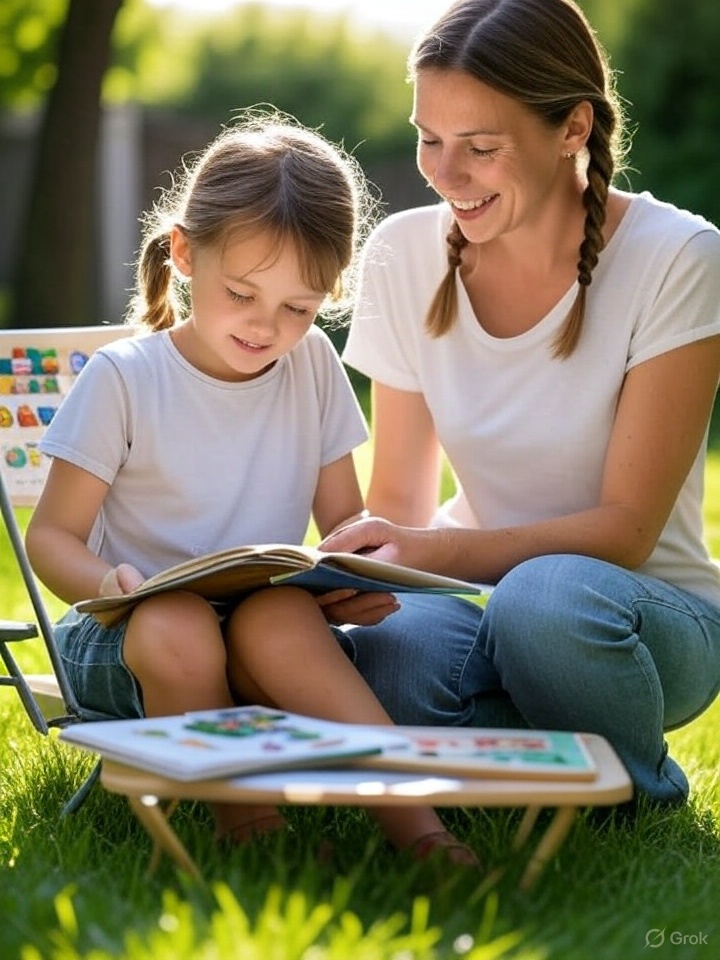Oh, summer! Long sunny days (when they appear), ice creams, paddling pools, and no alarm clocks. What’s not to love? For primary-age children, this break is essential. They need time to play, create, explore—and just be kids. But here’s the honest truth: too much time off can mean forgetting lots of what they learnt during a busy school year. So a sprinkling of gentle learning during the holidays helps keep the wonder alive… without turning into a classroom at the beach.
What is the “summer slide”?
Let’s start with the facts. The phrase “summer slide” (also called summer learning loss) refers to the dip in academic skills—especially in reading and maths—that can happen over the long summer break. It’s not just a worry for teachers—studies back it up.
A well-known meta-analysis by Harris Cooper and colleagues at Duke University (1996) found that children lose, on average, one month of schooling over the summer—particularly in maths, and more so in older primary pupils.
More recent research has confirmed this. For example:
- Children can lose 20–30% of reading progress and even more in maths over the holidays.
- Around 70–78% of children in primary school show a drop in maths skills during the summer.
- One study found children could fall behind by up to two months in reading without any summer practice.
That’s a lot of knowledge to rebuild come September!
Why does this happen?
Sociologist Karl Alexander developed the “faucet theory” to help explain it. During term time, the ‘tap’ of education flows for all children, thanks to school. But in summer, that tap slows or even shuts off—especially for children without access to books, educational activities or adult help. Over time, this can widen the gap between children who have regular support at home and those who don’t.
In short, the longer the break without practice, the harder it is to retain learning—particularly for younger pupils who are still building foundations in literacy and numeracy.
But wait—children need rest too!
Yes, absolutely! We’re not suggesting kids should be doing spelling drills in August or writing essays on the beach. The summer holiday is a vital time for rest, imagination, freedom and play. And that’s not just fluffy thinking—numerous studies highlight the importance of unstructured time for mental health, emotional growth and creativity.
Children need a break from routines and formal tasks. A bit of screen time, paddling pool splashes, sandcastle competitions and garden bug hunts are all part of a happy, healthy childhood.
But the key is balance. A small amount of playful learning can go a long way in keeping knowledge fresh and building confidence for the new school year.
How to keep skills fresh (without spoiling the fun)
Here are some tried-and-tested, light-touch ideas to keep learning alive in a fun, family-friendly way:
1. Read for 10–15 minutes a day
Reading for just 10–15 minutes each day can help children keep up the reading fluency and comprehension they’ve worked hard on during term time. It doesn’t have to be a schoolbook—comics, fact books, joke books and graphic novels count too.
Local libraries often run a Summer Reading Challenge with rewards and fun themes. It’s a brilliant way to build reading into your child’s routine without any pressure.
2. Play spelling and word games
Try games like Scrabble, Boggle or hangman. Make up silly rhymes or challenge your child to find five objects around the house beginning with a certain letter. You could even create a ‘spelling treasure hunt’ using tricky words from the year group spelling list.
3. Retrieval practice – made easy
This simply means getting children to remember something they’ve previously learnt. Ask your child to explain how shadows are made, or what happened in their favourite history topic. You can do it during a walk, car journey or even while brushing teeth!
Retrieval strengthens memory pathways and makes learning stick, especially if repeated over time.
4. Real-world maths
Maths doesn’t have to mean worksheets. Summer is full of natural maths moments:
- Cooking and baking (weighing, timing, measuring)
- Shopping (adding prices, working out change)
- DIY or gardening (measuring length, counting seeds)
- Timetables and travel plans (time, duration, maps)
These quick conversations can do wonders for keeping number skills alive.
5. Light-touch quizzes and puzzles
Word searches, number puzzles and brain teasers are great for those quieter moments (like car journeys or rainy afternoons). Many are printable for free online. Try setting a “morning challenge” to get minds ticking before a day of fun.
What does research say helps?
There’s good news: even short bursts of learning can make a big difference. Research consistently shows that:
- Regular, low-pressure engagement helps reduce the summer slide
- Parent involvement boosts effectiveness—simple activities done together have real impact
- Free choice and play improve motivation, especially when children are in control of what they read or explore
Summer learning doesn’t need to be formal or time-consuming—it just needs to be consistent and enjoyable.
A balanced summer routine
You don’t need a strict timetable, but a gentle rhythm might help. Here’s one idea:
- Morning: Outdoor play, park trip, bike ride, den building
- Late morning: 10–15 mins reading or fun spelling challenge
- Afternoon: Crafting, swimming, playdates, baking
- Evening: Quiz, bedtime story, riddles, gentle puzzles
Sprinkle in a few learning moments each day and keep the rest light and joyful.You can also try the Summer Reading challenge!
Final thoughts: keeping the wonder alive
Summer should be full of wonder—exploring, laughing, relaxing and trying new things. But with a tiny bit of structure and support, your child can return to school full of confidence, rather than playing catch-up.
Whether it’s reading under a tree, baking brownies with fractions, or chatting about history over dinner, it all counts. These little moments help children feel proud of what they know and ready for what comes next.
So enjoy every sunny second of summer—and don’t worry, a little wonder-filled learning will go a long way.

